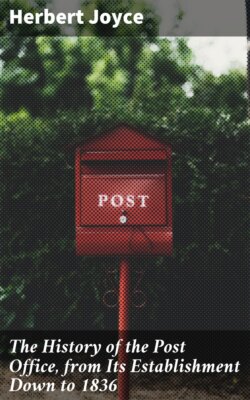The History of the Post Office, from Its Establishment Down to 1836

Реклама. ООО «ЛитРес», ИНН: 7719571260.
Оглавление
Herbert Joyce. The History of the Post Office, from Its Establishment Down to 1836
The History of the Post Office, from Its Establishment Down to 1836
Table of Contents
ERRATA
HISTORY OF THE POST OFFICE
CHAPTER I
EARLY POSTS. 1533–1609
CHAPTER II
THE BATTLE OF THE PATENTS. 1609–1635
CHAPTER III
THOMAS WITHERINGS. 1635—1644
CHAPTER IV
EDMUND PRIDEAUX AND CLEMENT OXENBRIDGE. 1644—1660
CHAPTER V
WILLIAM DOCKWRA. 1660–1685
CHAPTER VI
COTTON AND FRANKLAND. Inland Service 1685–1705
CHAPTER VII
COTTON AND FRANKLAND. Packet Service 1686–1713
CHAPTER VIII
AMERICAN POSTS. 1692–1707
CHAPTER IX
THE POST OFFICE ACT OF 1711
CHAPTER X
RALPH ALLEN. 1720–1764
CHAPTER XI
LEGISLATION AND LITIGATION. 1764–1782
CHAPTER XII
JOHN PALMER. 1782–1792
CHAPTER XIII
THE NINETIES: OR, ONE HUNDRED YEARS AGO
CHAPTER XIV
FRANCIS FREELING. 1798–1817
CHAPTER XV
IRELAND. 1801–1828
CHAPTER XVI
THE BEGINNING OF THE END. 1817–1836
APPENDIX
SUCCESSION OF POSTMASTERS-GENERAL. from 1660 to 1836
SUCCESSION OF SECRETARIES TO THE POST OFFICE down to 1836
INDEX
FOOTNOTES:
Отрывок из книги
Herbert Joyce
Published by Good Press, 2019
.....
Happily, in England the spirit of enterprise is such that an acknowledged want affecting any considerable section of the public is seldom suffered to endure very long. And so it proved in the present instance. The man who now undertook to relieve the capital from the intolerable inconvenience under which it laboured was William Dockwra, a merchant of the city of London. Dockwra had been a sub-searcher in the Custom House, and through some little interest he possessed at Court had been allowed to dispose of his place. The idea of the penny post is said indeed to have originated with Robert Murray, an upholsterer in Paternoster Row; but, be that as it may, to Dockwra belongs the credit of giving it practical shape. A man of less resolution or less convinced of the inherent merits of his undertaking might well have been daunted by the difficulties he had to encounter. The undertaking had been conceived in so bold a spirit that to carry it out would involve an expense which Dockwra's unaided resources were altogether unable to bear. A difficulty still greater than the want of funds was the determined opposition of the Duke of York. In 1663 the profits of the Post Office had been settled on the Duke for his support and maintenance, and, with an eye ever intent on his own interests, he discerned or thought he discerned in the new project an infringement of his rights.
Undeterred by these difficulties, Dockwra persevered in the task he had taken in hand. At length the appointed day arrived. On the 1st of April 1680,[9] London, which had hitherto had no post at all, suddenly found itself in possession of one in comparison with which even the post of our own time is cast into the shade. For the purposes of the undertaking London and its suburbs were divided into seven districts with a sorting office in each. From Hackney in the north to Lambeth in the south, from Blackwall in the east to Westminster in the west, there was not a point within the bills of mortality which the new post did not reach. Between four and five hundred receiving offices were opened in a single morning. Placards were distributed and advertisements inserted in the public intelligences announcing where these offices were. Messengers called there for letters every hour. These, if for the country, were carried to the General Post Office, and if for the town, to the respective sorting offices. From the sorting offices, after being sorted and entered in books kept for the purpose, they were sent out for delivery, to the Inns of Court or places of business ten or twelve times a day, and to other places according to distance from four to eight times. Nor was the service confined to letters. It extended also to parcels, the only condition being that neither parcel nor letter should exceed one pound in weight,[10] or ten pounds in value. Subject to these limitations the charge between one part of London and another was one penny. An exception indeed was made in the case of Hackney, Islington, Newington Butts, and Lambeth, which were then separate towns. There one penny carried only to the receiving office, and for delivery at a private house the charge was one penny more. Delivery in the street was not allowed.
.....